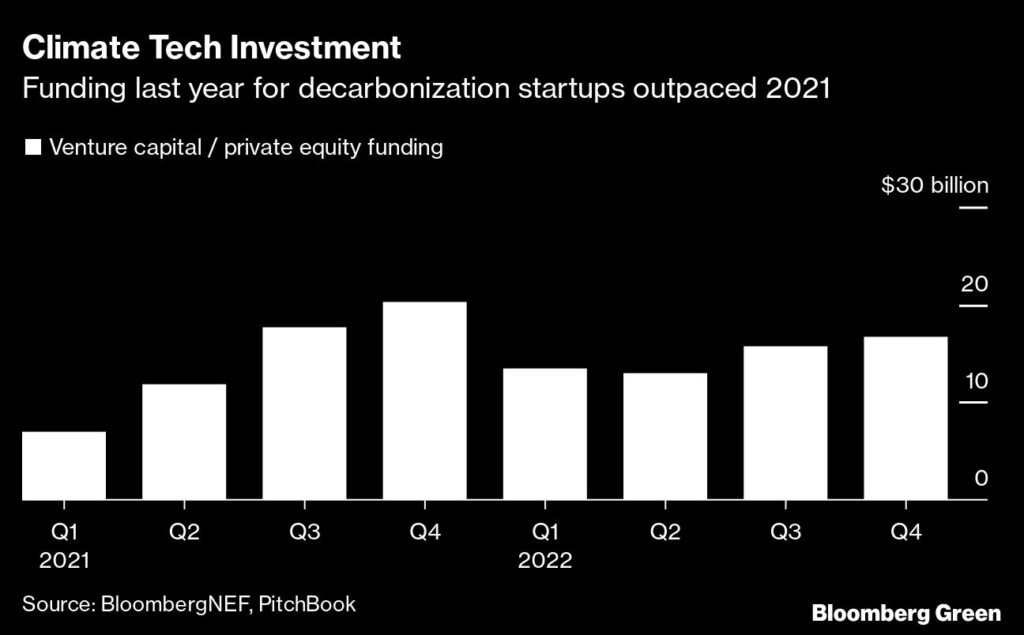Funding for startups aiming to decarbonize the environment rose 4% in 2022.
(Bloomberg) — Soaring energy costs bolstered investor demand for technology to reduce reliance on fossil fuels last year, providing a bright spot amid a meltdown in global markets.
Investment in climate tech by venture capital and private equity swelled to $59 billion, a 4% increase from 2021, according to a report published Wednesday by BloombergNEF, a clean energy research group. Funding for transportation, including electric vehicles, and companies focusing on clean energy including solar and wind led the 1,182 deals in the period.
Russia’s invasion of Ukraine at the start of last year pushed oil prices into the triple digits, while economies reopening from Covid lockdowns lifted energy consumption and prices. It made for a tough year for global markets, with both bonds and equities posting their worst year in a decade. Climate tech’s robust showing managed to counter this gloom, even with a roughly 30% drop in overall US VC funding from 2021 to 2022, according to preliminary data from research firm PitchBook.
“Climate-tech startups are all about providing resources or improving the efficiency of our resource consumption,” BloombergNEF analyst and report author Mark Daly said. “In a year where energy and commodity prices spiked, this boosted the value proposition of climate-tech startups.”
There may be scope for investor appetite to continue as there’s plenty of capital to deploy in the years to come — some 60 climate-tech funds closed in 2022, raising $24 billion, according to the report.
The median deal size expanded last year, growing to $10 million versus $7 million in 2021. Among the companies pulling in $1 billion or more were InterEnergy Holdings, a clean energy project developer operating in Latin America and the Caribbean, and Rubicon Carbon, offering carbon reduction and removal services.
While climate tech often is a field for fast-growing startups, Daly noted that some investments last year didn’t necessarily require a step into little-tested approaches to tackling a warming planet. “These were late-stage deals where there’s very little technology risk, and it’s just about scaling, manufacturing,” he said.
Companies in the United States attracted 38% of funding last year, the most of any region, followed by China at 25%. Incentives from US President Joe Biden’s landmark climate law, the Inflation Reduction Act, have encouraged investments in clean tech innovation both domestically and abroad, according to Antoine Vagneur-Jones, BloombergNEF’s head of trade and supply chains.
The incentives “have galvanized investor interest across a range of energy transition sectors — from battery factories to photovoltaic manufacturing to hydrogen and carbon capture and storage,” he said.
However, China was the leader in electric vehicle and other low-carbon transport investment, at 49%, followed by the US at 19%. EV maker GAC Aion New Energy Automobile raked in $2.6 billion, while Sunwoda Electronic Co. raised $1.2 billion.
Not every sector gained. Overall, last year’s fourth quarter saw a roughly 17% decline in funding compared to a year earlier. Agriculture posted the biggest full-year funding decline of any sector in 2022, falling 55%, as investors flocked to tech benefitting from new policy environments in the US and Europe to accelerate decarbonization. Funding for alternative fuels declined throughout the year. Money for the mobility sector dried up — BloombergNEF noted that the largest ride-hailing companies, like Uber Technologies Inc. and Lyft Inc., now trade publicly and their shares suffered last year.
More stories like this are available on bloomberg.com
©2023 Bloomberg L.P.










